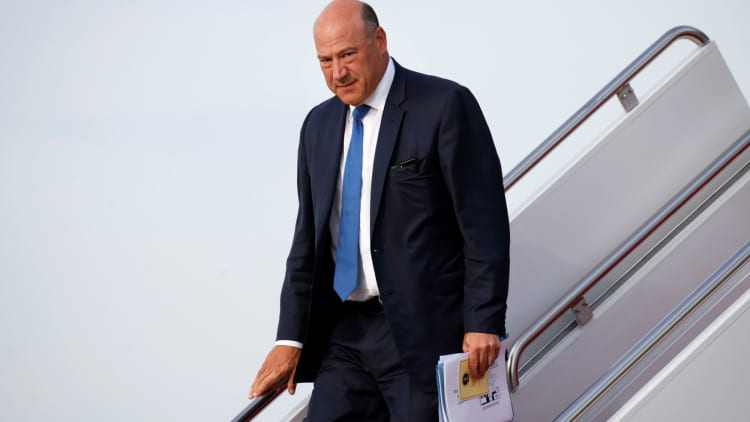
In the dizzying thrill ride that has been the 2017 news cycle, it seems only fitting that suddenly the most likely person to be Fed chair when Janet Yellen's term expires in six months is either Yellen herself or someone who is pretty much her complete ideological opposite.
That seemed hardly possible just a few days ago. Wall Street was certain that Yellen, the architect of the Fed's tepid march back to normalization, stood only a remote chance of being renominated in February.
The market was getting increasingly more comfortable that White House economic advisor Gary Cohn had all but secured the position.
Yellen seemed to signal as much on Aug. 25, when a speech she gave at the Fed's annual Jackson Hole, Wyoming, summit was seen by many as an admonition of President Donald Trump about easing banking regulations.
Since then, though, Cohn gave an interview with the Financial Times in which he expressed dismay at statements Trump made regarding the racial violence in Charlottesville, Virginia. On Wednesday, a Wall Street Journal report gave credence to what many had suspected: That the FT interview may have torpedoed the chances that Cohn, currently Trump's top economic advisor, had to lead the Fed.
Moreover, there's increasing chatter out of Congress that Cohn would face a blistering path to confirmation. Democrats are privately saying that a Goldman Sachs alumnus, such as Cohn, would stand virtually no chance of garnering any votes from that side of the aisle for a position that would oversee the banking system.
Re-enter Yellen.
"I think she's still on the short list, despite the Jackson Hole speech" said Greg Valliere, chief global strategist at Horizon Investments. "Cohn's standing his slipped following his Financial Times interview."
However, she's not alone.
Former Fed Governor and Morgan Stanley executive Kevin Warsh has zoomed up the probability charts, at least if chatter from Fed observers and online prediction site PredictIt is correct. As of Thursday afternoon, Warsh was the slight favorite, with a 30 percent chance compared with Yellen's 29 percent.
"He bridges the world of a central banker but also having the market experience, which is a strong combination," said Quincy Krosby, chief market strategist at Prudential Financial. "Perhaps the thinking will be that someone who has Wall Street experience understands markets."
Cohn has slumped all the way to 11 percent after the Journal story, while Stanford economist John Taylor was next at 8 percent.
"The president is going to choose someone both with experience in the market and understanding of the markets," Krosby added. "We don't know if [Yellen] wants it. She's been very discrete and many are saying that Jackson Hole could have been her swan song."
Warsh, though, puts a new wrinkle into the situation.
Contrary to Yellen, Warsh is considered more hawkish when it comes to monetary policy, meaning he would pursue a faster path for interest rate hikes than the plodding march on which the Fed currently finds itself.
CNBC has reached out to Warsh and the White House for comment.
Whether Trump would want a chair who favors higher rates is another matter. The president has been of two minds on the issue, criticizing Yellen during the 2016 campaign then praising her this year and emphasizing the need for a cheap dollar.
From a market perspective, investors might prefer someone who doesn't take orders from the president at all.
"You don't want someone who is going to jeopardize the independence of the Fed," Krosby said.
Banking analyst Dick Bove worries about a scenario where Trump would have a relationship with the Fed chair on par with what Richard Nixon had with Arthur Burns.
Trump "is in the Nixon camp as best I can determine," said Bove, of the Vertical Group and formerly Rafferty Capital Markets.
"It appears that the Fed is about to be debased again," Bove said in a note. "This is happening at a time when it appears the Fed is losing control of its balance sheet, and when loyalty to the President will be critical in obtaining a seat on the Board."
Indeed, Trump has placed a high value on loyalty when making appointments and may be looking for the same in his central bankers. Trump will have the unique opportunity to fill at least four of the seven governorships at the Fed, giving him the chance to shape it in his own ideological vision. Nominee Randal Quarles cleared one hurdle Thursday when he was approved by a Senate committee.
Yellen's term is drawing to an end as the Fed is trying to navigate back to normal after all the accommodation begun during the financial crisis. The Yellen Fed has approved four rate hikes and likely will start reducing its $4.5 trillion balance sheet in October.
Markets will be watching closely to see whether the Fed can clear both hurdles cleanly.
"There's an expression that always haunts us: When rates rise, something always breaks," Krosby said. "Janet Yellen has been trying very hard to transition to normal monetary policy, to make sure something doesn't break. ... The question then becomes, does someone who comes in understand that and know the history of the Fed's experience in raising rates?"
WATCH: Yellen defends post-crisis banking reforms.



